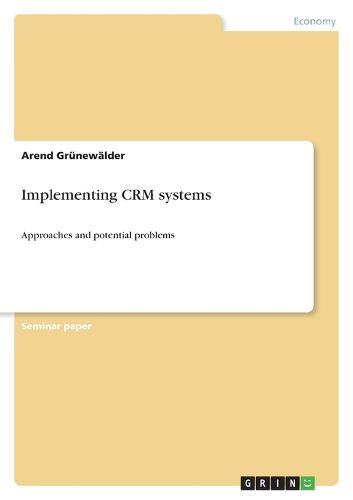Readings Newsletter
Become a Readings Member to make your shopping experience even easier.
Sign in or sign up for free!
You’re not far away from qualifying for FREE standard shipping within Australia
You’ve qualified for FREE standard shipping within Australia
The cart is loading…






Seminar paper from the year 2007 in the subject Business economics - Marketing, Corporate Communication, CRM, Market Research, Social Media, grade: 1,7, University of applied sciences, Munich, course: Customer Relationship Management, 7 entries in the bibliography, language: English, abstract: Investing in information technology without relevant questions or a plan for application can lead to the development of a very expensive toy that offers no return on investment. While the planning and implementation of the CRM projects are examined in this work, potential organisational problems and barriers in the attitude of involved employees are analyzed for each implementation phase. The foundation of an accurate CRM implementation is the adoption of a firm’s strategy that should be designed to optimize both profitability and customer satisfaction. Many organisations today have discovered it is a mistake to think about Customer Relationship Management (CRM) systems exclusively in technological terms. A customer focus without accurate information is similar to attempting to circumnavigate the planet without a map.1 Investing in information technology without relevant questions or a plan for application can lead to the development of a very expensive toy that offers no return on investment. While the planning and implementation of the CRM projects are examined in this work, potential organisational problems and barriers in the attitude of involved employees are analyzed for each implementation phase. The foundation of an accurate CRM implementation is the adoption of a firm’s strategy that should be designed to optimize both profitability and customer satisfaction. To realize CRM, organisations must foster behaviours and implement processes and technologies which support coordinated customer interactions throughout all customer channels. In order to achieve this, organisations must develop the strategic and functional components of the CRM projects. The implementation of a
$9.00 standard shipping within Australia
FREE standard shipping within Australia for orders over $100.00
Express & International shipping calculated at checkout
Seminar paper from the year 2007 in the subject Business economics - Marketing, Corporate Communication, CRM, Market Research, Social Media, grade: 1,7, University of applied sciences, Munich, course: Customer Relationship Management, 7 entries in the bibliography, language: English, abstract: Investing in information technology without relevant questions or a plan for application can lead to the development of a very expensive toy that offers no return on investment. While the planning and implementation of the CRM projects are examined in this work, potential organisational problems and barriers in the attitude of involved employees are analyzed for each implementation phase. The foundation of an accurate CRM implementation is the adoption of a firm’s strategy that should be designed to optimize both profitability and customer satisfaction. Many organisations today have discovered it is a mistake to think about Customer Relationship Management (CRM) systems exclusively in technological terms. A customer focus without accurate information is similar to attempting to circumnavigate the planet without a map.1 Investing in information technology without relevant questions or a plan for application can lead to the development of a very expensive toy that offers no return on investment. While the planning and implementation of the CRM projects are examined in this work, potential organisational problems and barriers in the attitude of involved employees are analyzed for each implementation phase. The foundation of an accurate CRM implementation is the adoption of a firm’s strategy that should be designed to optimize both profitability and customer satisfaction. To realize CRM, organisations must foster behaviours and implement processes and technologies which support coordinated customer interactions throughout all customer channels. In order to achieve this, organisations must develop the strategic and functional components of the CRM projects. The implementation of a